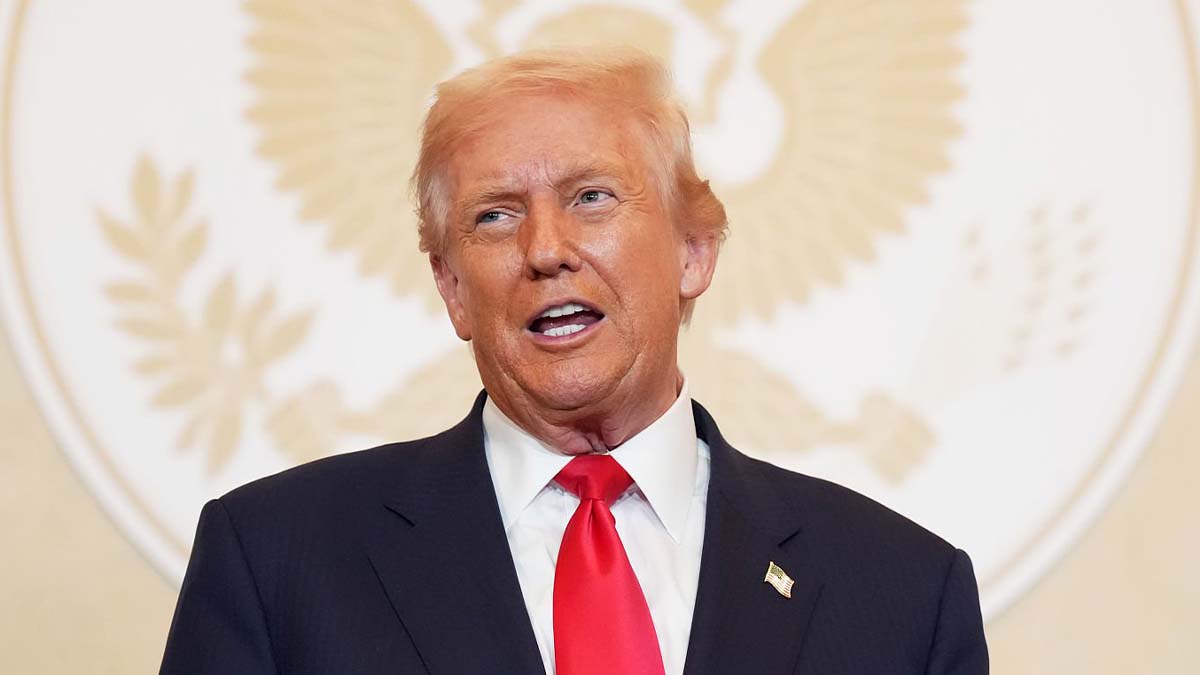President Donald Trump delivered a firm rebuke to swirling rumors of a vice presidential bid in 2028, dismissing the idea as “too cute” and politically unpalatable. Yet, in classic Trump fashion, he left the door ajar for an outright third presidential run—despite the U.S. Constitution’s ironclad prohibition—declaring he “would love to do it” amid his sky-high approval ratings. The remarks, made to reporters on October 27, have ignited a firestorm of debate, dividing Republicans between those hungry for extended Trump dominance and others wary of constitutional overreach.
The 79-year-old commander-in-chief, fresh off a sweeping 2024 victory that returned him to the White House, has long toyed with the notion of defying term limits. At rallies, he’s distributed “Trump 2028” hats emblazoned with “Rewrite the Rules,” and his official merchandise store now hawks T-shirts mocking Democratic fears of eternal incumbency. Allies like podcaster Steve Bannon have amplified the chatter, floating wild theories about challenging the 22nd Amendment, which bars any president from being elected more than twice. Trump’s latest comments, however, draw a line at the VP workaround—a scheme where he could theoretically run as second fiddle to a placeholder like Vice President JD Vance, only for that candidate to resign post-election, elevating Trump once more.
“I would be allowed to do that,” Trump acknowledged when pressed on the VP gambit during his overseas jaunt. “But I wouldn’t do that. I think it’s too cute. Yeah, I would rule that out because it’s too cute. I think the people wouldn’t like that. It’s too cute. It wouldn’t be right.” The phrasing—equal parts folksy dismissal and strategic pivot—echoes Trump’s dealmaker persona, where he builds suspense only to pull back just enough to keep the spotlight blazing.
Legal experts were quick to pounce, underscoring the fantasy of it all. Constitutional scholar Kimberly Wehle of Baltimore University Law School told Newsweek that the 22nd Amendment isn’t merely advisory; it’s a bedrock safeguard against monarchical tendencies, requiring a two-thirds congressional vote and three-quarters state ratification for repeal—a Herculean feat in today’s polarized Congress. The VP route fares no better under the 12th Amendment, which mandates that vice presidents must be eligible for the presidency. “It’s not self-executing in the sense that courts might need to intervene, but it’s unequivocally binding,” Wehle explained. “Any attempt would trigger immediate lawsuits, Supreme Court chaos, and likely impeachment proceedings.”
Trump’s flirtation with a third term isn’t new. In April, his Truth Social feed lit up with an AI-generated video parodying Time magazine covers: “Trump 2028,” “Trump 2032,” culminating in “Trump 4EVA.” At a recent White House meeting with Democratic leaders Hakeem Jeffries and Chuck Schumer, he reportedly plunked “Trump 2028” caps on the table like poker chips. Polling backs his bravado—recent surveys show his approval hovering near 60%, buoyed by economic rebounds and foreign policy wins, including a fragile Gaza ceasefire now tested by Israeli strikes. “I have my best numbers ever,” Trump boasted. “It’s very terrible” for his opponents, he quipped, refusing to “really think about” legal battles over eligibility.
The VP rejection, though, signals a subtle shift. Trump pivoted to anointing successors, lavishing praise on his inner circle. “JD Vance and Marco Rubio are great people,” he said. “If they team up, nobody’s going to beat them.” Vance, the Ohio senator turned VP, is already the bookies’ favorite for the 2028 GOP nod, with early polls giving him a 35% edge in primaries. Rubio, the Florida firebrand now helming State, adds foreign policy gravitas. Their tandem could echo the Reagan-Bush dynasty, blending Midwestern grit with Sunshine State swagger. Yet, Trump’s endorsement feels like a hedge—positioning him as kingmaker while stoking MAGA fervor for his potential return.
Social media erupted, with X (formerly Twitter) ablaze under hashtags like #Trump2028 and #TooCute. Reuters’ World News podcast dissected the legal minefield, noting how Trump’s rhetoric keeps donors and base energized without committing to the courtroom. Posts ranged from ecstatic (“Trump forever! Rewrite the rules!”) to skeptical (“This is how dictators start—term limits exist for a reason”). One viral thread from @SecWar, the U.S. Secretary of War, tied the buzz to recent narco-terrorist strikes in the Pacific, framing Trump’s legacy as one of unyielding defense: “We’ve spent decades defending others. Now, we defend our own.”
Democrats, licking wounds from 2024, see opportunity in the chaos. Former VP Kamala Harris, in a weekend interview, hinted at her own 2028 ambitions, vowing she’s “not done with politics.” California Gov. Gavin Newsom echoed the tease, confirming exploratory moves. But Trump’s shadow looms large; a third-term push could fracture the GOP, alienating moderates like Rubio while galvanizing the hard-right.
At 82 by inauguration day 2029, a third-term Trump would shatter age records, eclipsing even his current tenure’s health scrutiny. He recently touted a “perfect” MRI from Walter Reed, brushing off concerns with, “If you give her an IQ test… let AOC go against Trump.” The quip targeted Rep. Alexandria Ocasio-Cortez, underscoring his enduring knack for personal jabs.
As the 2028 cycle dawns prematurely, Trump’s Air Force One soliloquy crystallizes the stakes: a republic wrestling with its guardrails. Will the 22nd Amendment hold, or will MAGA’s messiah test its mettle? For now, the president rules out the “cute” detour but dreams aloud of the direct path. In Washington, where power is the ultimate aphrodisiac, that’s breaking news enough to fuel a thousand headlines.
